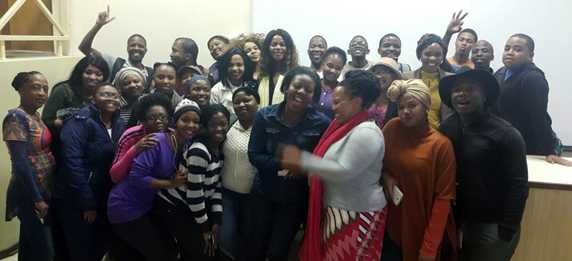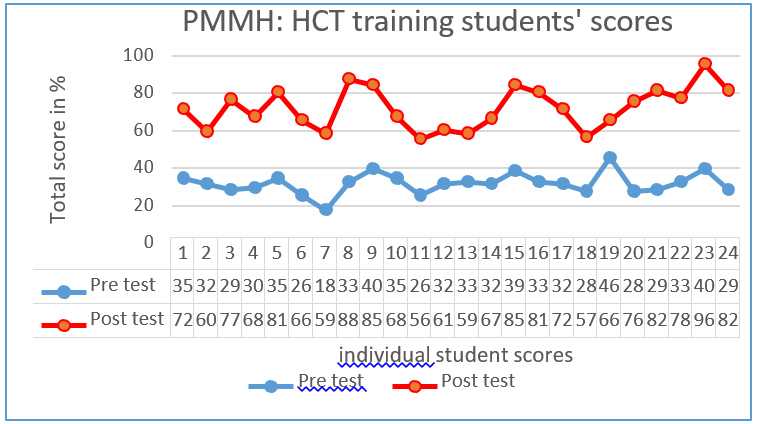Nursing Education Partnership Initiative (NEPI) Tackles the Challenge of Low HIV Competency by Building HIV Counselling and Testing Capacity of Pipeline Students
Challenge: The shift of HIV care and treatment tasks to nurses in settings where there is an inadequate number of doctors is now regarded as a ‘best practice’ in areas with a high burden of HIV and a shortage of healthcare workers. This shift is particularly critical in South Africa, where the adult HIV prevalence is estimated around at 16%, with nurses at the frontline providing most of the health care services, often without adequate resources, support, or training. Training in Nurse Initiated and Managed Anti-Retroviral Treatment (NIMART), which shifts all aspects of HIV management to nurses, has traditionally focused on in-service nurses only. However, as the response to the HIV epidemic evolves from emergency care to control and eventually to viral suppression, the importance of integrating HIV core competences into pre-service training becomes equally significant.

Figure1: Students from Free State School of Nursing-Welkom campus
Recognizing that achieving sustainable control of the HIV epidemic in South Africa depends on building a workforce of well trained, clinically competent nurses, the Health Resources Services Administration (HRSA), a U.S. Government agency participating in the United States Presidents’ Emergency Plan for AIDS Relief (PEPFAR), launched the Nursing Education Partnership Initiative (NEPI) in 2010 as part of the Global Nurse Capacity Building Program (GNCBP). NEPI aims to increase the number and quality of nurses and midwives in Africa. Since its launch in 2015, the NEPI project in South Africa has partnered with the Ministry of Health to strengthen nursing and midwifery education at Prince Mshiyeni School of Nursing, Free State School of Nursing, and Mpumlanga School of Nursing.
In January 2016, NEPI in South Africa conducted a survey to assess the HIV competencies of the nursing students at all three NEPI supported institutions. The survey revealed that the majority of students surveyed were not confident in managing HIV clients, either due to a lack of adequate clinical exposure or a lack of overall training. The survey highlighted a clear need for an immediate intervention for “pipeline” students - students who started before the implementation of NEPI and who were enrolled in programs that were not part of the NEPI support plan.

Table 1: Pre & Post-Test Results from the Prince Mshiyeni Campus.
Impact: The post training assessment resulted in a 100% pass rate by the students from Prince Mshiyeni, demonstrating a significant uptake in HIV/AIDS knowledge following the training. Post-test assessments for the other two schools are still being finalized. Overall, the students’ evaluation of the HCT course was very positive. Both students and lecturers expressed that they found the HCT training effective, beneficial, and an added value to the students’ professional, academic, and personal growth. Further, students felt that since the content of the training was related to HIV/AIDS care, they would be able to directly apply the skills learned in their future practice. In addition, the post assessment showed that their confidence in their ability to provide HIV care had increased significantly. Student’s anecdotal comments reflected value gained from the opportunity.
I have learned more about the importance of counseling a patient in preparation for them finding out about their status. I am very grateful to have been exposed to this form of training. Before this course I
had no confidence in giving advice to patients on the importance of testing for their HIV status. Today’s
patients ask a lot of questions and you have to know your story before giving advice.
The greatest impact of the course for me was that now I know how to interpret the [test] results. I have also learned about the different HIV viruses and how it can get transferred from one person to another.
Through the training I learned about HIV primary prevention.
The training was productive; it really changed our mind-sets towards HIV. It provided greater knowledge about [the] importance of counseling and we learned about clinical staging of HIV patients.
Summary: The HCT training bridged the gap for students who began their nursing programs before the implementation of NEPI. As a result of this training, these students will enter the
workforce better prepared to independently provide HIV/AIDS services in high HIV burden areas, such as the districts where these schools are located. This short course will lay the foundation
for more advanced HIV training and can contribute to the scale up of HIV services to meet the
90-90-90 targets.
- Page last reviewed: February 14, 2017
- Page last updated: February 14, 2017
- Content source:
Global Health
Notice: Linking to a non-federal site does not constitute an endorsement by HHS, CDC or any of its employees of the sponsors or the information and products presented on the site.


 ShareCompartir
ShareCompartir